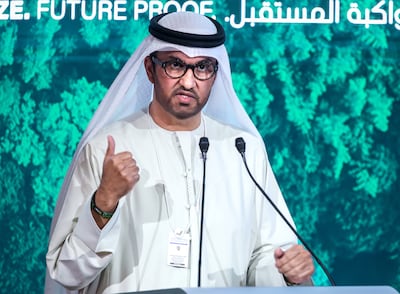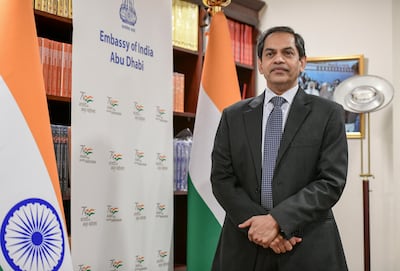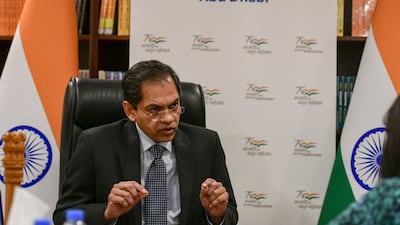Sunjay Sudhir, India's ambassador to the UAE, has backed the Emirates to ensure Cop28 is a summit of action and called on the global community to remain united in the fight against climate change.
He said an inclusive approach to crunch talks fostered by Dr Sultan Al Jaber, Cop28 President-designate, would be key to bringing about change at the conference and beyond.
The envoy said it was clear the world remained “off-track” in its goal to limit global temperature rises to no more than 1.5°C above pre-industrial levels, as set out by the Paris Agreement at Cop21.
World leaders, senior officials and climate advocates will convene at Cop28, which will be held at Expo City Dubai from November 30 to December 12.
We see the UAE being fully committed to making Cop28 a Cop of action
Sunjay Sudhir
Mr Sudhir dismissed concerns raised in some quarters over the UAE's hosting of the event and Dr Al Jaber's role leading the summit, due to his position as head of the Abu Dhabi National Oil Company.
“I do not see any irony in UAE hosting Cop. At times, Cop will be hosted by countries who are net exporters of fossil fuels and at other times by those who are not net importers [of fossil fuels],” Mr Sudhir told The National on Monday.
“We see the UAE being fully committed to making Cop28 a Cop of action and not mere assertions. Fossil fuels cannot be wished away. Let us be realistic and make fossil fuels a part of the solution.”
A letter signed by a number of members of the US Congress and the European Parliament called for the influence of oil and gas lobbyists to be curbed at this year's climate talks.
It called on Dr Sultan Al Jaber, the UAE’s Minister of Industry and Advanced Technology, to withdraw as the summit’s President-designate because he heads the Abu Dhabi National Oil Company.
The letter puts the signatories at odds with the US and EU’s top leadership.
“Dr Sultan Al Jaber is an experienced diplomat and business leader, including as chairman of renewable energy company Masdar,” a US government official told The National last week.
Nicholas Lyons, Lord Mayor of London, echoed those sentiments, saying the UAE had been “extraordinarily methodical” in its approach to its hosting duties.
“It's really timely this is being hosted by a hydrocarbon economy and it's being chaired by someone who chairs a hydrocarbon company with a background as the chief executive of a renewable technology company,” he said.
Mr Sudhir said Dr Jaber’s solid track record in renewables as the chief executive and chairman of Masdar and his participation in a number of previous Cop events demonstrated his credentials for the task in hand.
“It is a qualification which I do not think any single individual can ever bring to the table,” said the envoy.
“Dr Sultan’s idea of creating an inclusive discourse is actually what the world needs today for action. All reports point to one single fact – the world is off track on the 1.5°C targets and the only way we can do anything about it is if everyone works together,” he added.
Call to support developing nations
Mr Sudhir underlined the importance of addressing the disproportionate impact of climate change on developing nations, which threatens to exacerbate poverty, inequality, food security, water availability, and health challenges.
He spoke of the need for the Global North – a term used to describe more developed nations such as those in North America and Europe – to deliver support to those in the Global South, spanning Latin America, Africa, Asia and Oceania.
The diplomat welcomed the UAE's call to Global North nations to fulfil their commitment of $100 billion for the Green Climate Fund.
The lopsided nature of the current climate action agenda, he said, predominantly benefits a small percentage of the world's population and overlooks the needs of the Global South.
“For the Global South, there are challenges of energy availability, accessibility and affordability.
“It is in need of technologies and focus on adaptation which can enable them to transition and meet their energy needs simultaneously. Unfortunately, Global North has hardly paid any attention to this fact,” he said.
The ambassador stressed the critical juncture at which the world finds itself, where choices need to be balanced between the imperative to adhere to the 1.5°C pathway and the need for the Global South to grow and develop.
“The Global South, including Sids [Small Island Developing States] and other developing countries, have contributed least to climate change but they suffer some of the worst consequences and are most vulnerable,” he said.
'Carbon capture technology is effective'
When asked about the UAE's emphasis on the strategy of carbon capture and storage (CCUS) technology, Mr Sudhir said it its effective for countries still dependent on fossil fuels.
CCUS is a process in which carbon dioxide is stored permanently underground, or turned into solid minerals or other useful products.
“Expectations that energy transition in the Global South will happen directly to renewable energy are neither realistic nor within the reach of countries of the Global South,” he said.
“The role of clean fossil fuels will be an integral part of a just, fair, and equitable energy transition. Only an energy transition which considers the developmental needs of the Global South will be most effective.”
CCUS is part of India’s Long-Term Low Emissions and Development Strategies announced at Cop 27 in Sharm El Sheikh. This includes technology that can capture carbon from polluting industries, so it never reaches the atmosphere, as well as advancing similar technologies.
As India aspires to become a $10 trillion economy by 2030, Mr Sudhir said his country is committed to balancing net-zero targets with concrete climate action.
“India is a global energy transition leader. Just, fair and equitable energy transition is a critical pillar of India’s growth and development agenda.”
He said India had made significant strides in renewable energy, with doubled hydropower capacity, a 22-fold increase in solar installed capacity, and significant reductions in solar tariffs.
“India stands fourth globally in Renewable Energy installed capacity including large hydro power. Nearly 43 per cent of total installed capacity comes from non-fossil fuel sources,” he said.
“India has set a target to reduce the carbon intensity of the nation’s economy by at least 45 per cent by the end of the decade, achieve 50 per cent cumulative electric power installed by 2030 from renewables, and achieve net-zero carbon emissions by 2070.”
The National Green Hydrogen Mission launched by India with the aim to produce 5 million tonnes of green hydrogen annually will result in 50 million tonnes of cumulative CO2 emissions abatement, he said.
Sheikh Mohammed reviews Cop28 preparations – in pictures
More on Quran memorisation:
2025 Fifa Club World Cup groups
Group A: Palmeiras, Porto, Al Ahly, Inter Miami.
Group B: Paris Saint-Germain, Atletico Madrid, Botafogo, Seattle.
Group C: Bayern Munich, Auckland City, Boca Juniors, Benfica.
Group D: Flamengo, ES Tunis, Chelsea, Leon.
Group E: River Plate, Urawa, Monterrey, Inter Milan.
Group F: Fluminense, Borussia Dortmund, Ulsan, Mamelodi Sundowns.
Group G: Manchester City, Wydad, Al Ain, Juventus.
Group H: Real Madrid, Al Hilal, Pachuca, Salzburg.
US PGA Championship in numbers
1 Joost Luiten produced a memorable hole in one at the par-three fourth in the first round.
2 To date, the only two players to win the PGA Championship after winning the week before are Rory McIlroy (2014 WGC-Bridgestone Invitational) and Tiger Woods (2007, WGC-Bridgestone Invitational). Hideki Matsuyama or Chris Stroud could have made it three.
3 Number of seasons without a major for McIlroy, who finished in a tie for 22nd.
4 Louis Oosthuizen has now finished second in all four of the game's major championships.
5 In the fifth hole of the final round, McIlroy holed his longest putt of the week - from 16ft 8in - for birdie.
6 For the sixth successive year, play was disrupted by bad weather with a delay of one hour and 43 minutes on Friday.
7 Seven under par (64) was the best round of the week, shot by Matsuyama and Francesco Molinari on Day 2.
8 Number of shots taken by Jason Day on the 18th hole in round three after a risky recovery shot backfired.
9 Jon Rahm's age in months the last time Phil Mickelson missed the cut in the US PGA, in 1995.
10 Jimmy Walker's opening round as defending champion was a 10-over-par 81.
11 The par-four 11th coincidentally ranked as the 11th hardest hole overall with a scoring average of 4.192.
12 Paul Casey was a combined 12 under par for his first round in this year's majors.
13 The average world ranking of the last 13 PGA winners before this week was 25. Kevin Kisner began the week ranked 25th.
14 The world ranking of Justin Thomas before his victory.
15 Of the top 15 players after 54 holes, only Oosthuizen had previously won a major.
16 The par-four 16th marks the start of Quail Hollow's so-called "Green Mile" of finishing holes, some of the toughest in golf.
17 The first round scoring average of the last 17 major champions was 67.2. Kisner and Thorbjorn Olesen shot 67 on day one at Quail Hollow.
18 For the first time in 18 majors, the eventual winner was over par after round one (Thomas shot 73).
Visit Abu Dhabi culinary team's top Emirati restaurants in Abu Dhabi
Yadoo’s House Restaurant & Cafe
For the karak and Yoodo's house platter with includes eggs, balaleet, khamir and chebab bread.
Golden Dallah
For the cappuccino, luqaimat and aseeda.
Al Mrzab Restaurant
For the shrimp murabian and Kuwaiti options including Kuwaiti machboos with kebab and spicy sauce.
Al Derwaza
For the fish hubul, regag bread, biryani and special seafood soup.
The%20specs
%3Cp%3E%3Cstrong%3EEngine%3A%20%3C%2Fstrong%3E2.0-litre%20four-cylinder%20turbo%20hybrid%0D%3Cbr%3E%3Cstrong%3EPower%3A%20%3C%2Fstrong%3E680hp%0D%3Cbr%3E%3Cstrong%3ETorque%3A%20%3C%2Fstrong%3E1%2C020Nm%0D%3Cbr%3E%3Cstrong%3ETransmission%3A%20%3C%2Fstrong%3E9-speed%20auto%0D%3Cbr%3E%3Cstrong%3EFuel%20consumption%3A%20%3C%2Fstrong%3E7.5L%2F100km%0D%3Cbr%3E%3Cstrong%3EOn%20sale%3A%20%3C%2Fstrong%3EEarly%202024%0D%3Cbr%3E%3Cstrong%3EPrice%3A%20%3C%2Fstrong%3EFrom%20Dh530%2C000%20(estimate)%3C%2Fp%3E%0A
The%20specs
%3Cp%3E%3Cstrong%3EPowertrain%3A%20%3C%2Fstrong%3ESingle%20electric%20motor%0D%3Cbr%3E%3Cstrong%3EPower%3A%20%3C%2Fstrong%3E201hp%0D%3Cbr%3E%3Cstrong%3ETorque%3A%20%3C%2Fstrong%3E310Nm%0D%3Cbr%3E%3Cstrong%3ETransmission%3A%20%3C%2Fstrong%3ESingle-speed%20auto%0D%3Cbr%3E%3Cstrong%3EBattery%3A%20%3C%2Fstrong%3E53kWh%20lithium-ion%20battery%20pack%20(GS%20base%20model)%3B%2070kWh%20battery%20pack%20(GF)%0D%3Cbr%3E%3Cstrong%3ETouring%20range%3A%20%3C%2Fstrong%3E350km%20(GS)%3B%20480km%20(GF)%0D%3Cbr%3E%3Cstrong%3EPrice%3A%20%3C%2Fstrong%3EFrom%20Dh129%2C900%20(GS)%3B%20Dh149%2C000%20(GF)%0D%3Cbr%3E%3Cstrong%3EOn%20sale%3A%3C%2Fstrong%3E%20Now%3C%2Fp%3E%0A
One in nine do not have enough to eat
Created in 1961, the World Food Programme is pledged to fight hunger worldwide as well as providing emergency food assistance in a crisis.
One of the organisation’s goals is the Zero Hunger Pledge, adopted by the international community in 2015 as one of the 17 Sustainable Goals for Sustainable Development, to end world hunger by 2030.
The WFP, a branch of the United Nations, is funded by voluntary donations from governments, businesses and private donations.
Almost two thirds of its operations currently take place in conflict zones, where it is calculated that people are more than three times likely to suffer from malnutrition than in peaceful countries.
It is currently estimated that one in nine people globally do not have enough to eat.
On any one day, the WFP estimates that it has 5,000 lorries, 20 ships and 70 aircraft on the move.
Outside emergencies, the WFP provides school meals to up to 25 million children in 63 countries, while working with communities to improve nutrition. Where possible, it buys supplies from developing countries to cut down transport cost and boost local economies.
Benefits of first-time home buyers' scheme
- Priority access to new homes from participating developers
- Discounts on sales price of off-plan units
- Flexible payment plans from developers
- Mortgages with better interest rates, faster approval times and reduced fees
- DLD registration fee can be paid through banks or credit cards at zero interest rates
The National's picks
4.35pm: Tilal Al Khalediah
5.10pm: Continous
5.45pm: Raging Torrent
6.20pm: West Acre
7pm: Flood Zone
7.40pm: Straight No Chaser
8.15pm: Romantic Warrior
8.50pm: Calandogan
9.30pm: Forever Young
Jetour T1 specs
Engine: 2-litre turbocharged
Power: 254hp
Torque: 390Nm
Price: From Dh126,000
Available: Now
2021 World Triathlon Championship Series
May 15: Yokohama, Japan
June 5: Leeds, UK
June 24: Montreal, Canada
July 10: Hamburg, Germany
Aug 17-22: Edmonton, Canada (World Triathlon Championship Final)
Nov 5-6 : Abu Dhabi, UAE
Date TBC: Chengdu, China
MATCH INFO
Argentina 47 (Tries: Sanchez, Tuculet (2), Mallia (2), De La Fuente, Bertranou; Cons: Sanchez 5, Urdapilleta)
United States 17 (Tries: Scully (2), Lasike; Cons: MacGinty)
Mohammed bin Zayed Majlis
MATCH DETAILS
Juventus 2 (Bonucci 36, Ronaldo 90 6)
Genoa 1 (Kouame 40)
The White Lotus: Season three
Creator: Mike White
Starring: Walton Goggins, Jason Isaacs, Natasha Rothwell
Rating: 4.5/5
Key 2013/14 UAE Motorsport dates
October 4: Round One of Rotax Max Challenge, Al Ain (karting)
October 1: 1 Round One of the inaugural UAE Desert Championship (rally)
November 1-3: Abu Dhabi Grand Prix (Formula One)
November 28-30: Dubai International Rally
January 9-11: 24Hrs of Dubai (Touring Cars / Endurance)
March 21: Round 11 of Rotax Max Challenge, Muscat, Oman (karting)
April 4-10: Abu Dhabi Desert Challenge (Endurance)









